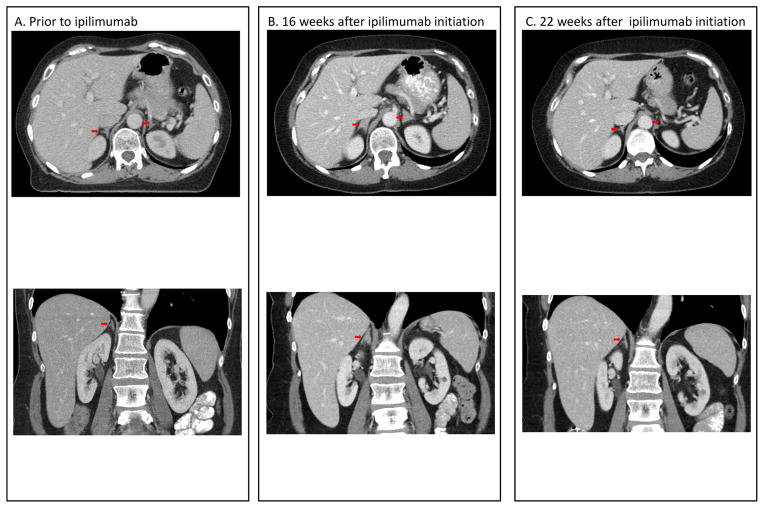A 56-year-old woman presented with fatigue and headache after receiving 4 doses of ipilimumab, a monoclonal antibody against Cytotoxic T-Lymphocyte Antigen 4, for metastatic melanoma. Low morning corticotropin and cortisol levels along with pituitary enlargement were consistent with hypophysitis related secondary adrenal insufficiency. She was started on replacement dose of hydrocortisone. Subsequent surveillance-computed tomography (CT) scan of the abdomen showed bilateral enlargement of adrenal glands (Panel B, arrows). Prior to ipilimumab therapy, her adrenal glands were normal in size (Panel A, arrows). Her serum cortisol and aldosterone failed to respond to cosyntropin stimulation demonstrating primary adrenal insufficiency. Six weeks later, her adrenal glands normalized in size (Panel C, arrows). The dynamic size change of the adrenal glands suggests ipilimumab related autoimmune adrenalitis. Although secondary adrenal insufficiency is a fairly common endocrinopathy related to ipilimumab therapy, it is important to identify primary adrenal insufficiency that may coexist with secondary adrenal insufficiency.
Acknowledgments
There is no funding source relevant to this case report. We confirm that Dr. Min was the lead clinician in charge of managing this patient’s Ipilimumab-related endocrinopathies and Dr. Ibrahim was the lead clinician in charge of managing this patient’s melanoma.
Footnotes
There are no conflicts of interest.
Contributor Information
Le Min, Email: lmin1@partners.org, Brigham and Women’s Hospital, Division of Endocrinology, 221 Longwood Avenue, Boston, MA 02115, Tel: 1 617 732 5661.
Nageatte Ibrahim, Email: nibrahim@partners.org, Dana-Farber Cancer Institute, 450 Brookline St, Boston, MA 02215, Tel: 1 617 632-4150.



